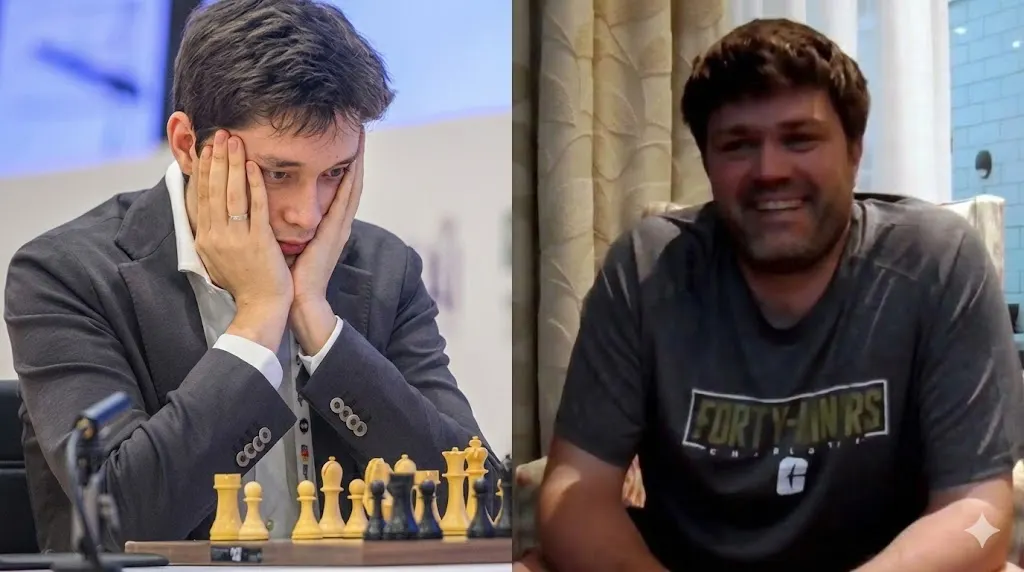A recent discussion on the popular Reddit community r/chess has ignited a fierce debate regarding the neutrality of the International Chess Federation (FIDE) and the participation of Russian players in top-level tournaments. The controversy centers on comments made by Peter Heine Nielsen, the long-time coach of former World Champion Magnus Carlsen, who has publicly criticized Russian Grandmaster Andrey Esipenko and FIDE’s handling of Russian teams.
The discussion, titled “Carlsen’s coach Peter Heine Nielsen calls out Esipenko’s Kremlin ties and Mariupol Propaganda appearance; Questions FIDE’s neutrality,” highlights a growing rift in the chess world between those who believe individual players should not be punished for their government’s actions and those who argue that “neutrality” has become a loophole for state propaganda.
The Allegations Against Andrey Esipenko
At the heart of Nielsen’s criticism is 23-year-old Russian Grandmaster Andrey Esipenko. Esipenko recently qualified for the prestigious 2026 Candidates Tournament by finishing third in the 2025 FIDE World Cup in Goa, India. While his performance on the board has been stellar, his off-board activities have drawn sharp condemnation from Nielsen.
Nielsen pointed to specific instances where he believes Esipenko has been used as a tool for Russian state propaganda:
- “Grandmaster of the Fatherland”: Nielsen highlighted that Russian state media has branded Esipenko with the nationalist moniker “Grandmaster of the Fatherland,” a title that Nielsen argues makes a mockery of the “neutral” flag Esipenko competes under.
- The Mariupol Movie Premiere: Perhaps the most contentious point is Esipenko’s attendance at the premiere of a Russian film that glorifies the invasion of Ukraine and specifically the siege of Mariupol. Nielsen described this as a clear endorsement of the war effort, distinguishing it from mere passive compliance.
- Sponsorship Deals: Nielsen also noted that Esipenko signed a 10-year sponsorship deal with the Russian Chess Federation (CFR), an organization Nielsen and other critics view as deeply intertwined with the Kremlin and the Russian military establishment.
Nielsen’s stance was further amplified during an exchange with former Women’s World Champion Susan Polgar. After Esipenko suffered a devastating blunder in the World Cup semifinals, Polgar posted a message on X (formerly Twitter) asking the chess community to show kindness to the young player. Nielsen responded directly, stating, “My sympathies are with the victims in Ukraine, not with one who attends the premiere as part of the Russian Chess Federation delegation to a war movie glorifying the attack on Mariupol.”
The “FIDE Team” Controversy at the 2025 Women’s World Team Championship
Parallel to the Esipenko debate, Nielsen slammed FIDE for allowing a Russian team to compete—and ultimately win—at the 2025 FIDE Women’s World Team Championship held in Linares, Spain, in November 2025.
Since the full-scale invasion of Ukraine in 2022, FIDE has generally followed International Olympic Committee (IOC) recommendations by banning the Russian and Belarusian flags and anthems. Russian players have competed as individuals under the FIDE flag. However, team competitions have typically been off-limits to Russian squads.
For the 2025 event, FIDE permitted a team composed entirely of Russian players to compete under the name “FIDE Team.” This decision sparked immediate backlash. The Ukrainian Chess Federation lodged a formal protest, arguing that allowing a de facto Russian national team to compete violated the spirit of the sanctions and FIDE’s own previous rulings.
Despite the protests, the “FIDE Team”—featuring stars like Aleksandra Goryachkina and Polina Shuvalova—dominated the event. They went undefeated and clinched the gold medal by beating Azerbaijan in the final. Nielsen called the team’s reinstatement and subsequent victory “a sad and very shameful day for chess,” arguing that it normalized the presence of the Russian Federation in international sports despite the ongoing war.
The Counter-Arguments
A Reddit thread discussing these events was tagged with “Misleading Title” by moderators, reflecting the complexity and nuance of the situation. Users and commentators offered several counter-arguments to Nielsen’s strict stance:
1. The 2022 Anti-War Letter: Defenders of Esipenko point out that he was one of 44 top Russian chess players who signed an open letter to Vladimir Putin in March 2022, explicitly calling for an end to the war. They argue that this proves his personal stance is not pro-war.
2. Life in an Authoritarian Regime: Many commenters highlighted the difficulty of living in Russia as a public figure. They suggested that Esipenko’s attendance at propaganda events or acceptance of CFR sponsorship might not be voluntary choices but rather requirements for continuing his professional career and ensuring his safety. As one user noted, “It is hard to take these people seriously when they go after players who have done more to protest their country’s crimes than top players from Western countries have.”
3. FIDE’s Legal Defense: FIDE has defended its decision regarding the Women’s Team Championship by claiming they sought a “letter of no-objection” from the IOC. When the IOC did not explicitly block the move, FIDE interpreted this as tacit consent to allow the team to play under a neutral flag.
A Deepening Divide
Peter Heine Nielsen is no stranger to chess politics. In 2022, he ran for FIDE Deputy President on a ticket with Ukrainian Grandmaster Andrii Baryshpolets, campaigning on a platform to reduce Russian influence in the organization. Although they lost to the incumbent Arkady Dvorkovich (a former Russian Deputy Prime Minister), Nielsen has remained a vocal watchdog.
The current controversy encapsulates the ongoing struggle within the chess world. On one side are those like Nielsen and the Ukrainian Chess Federation, who believe that “neutrality” is a fiction when players participate in state-sponsored propaganda and that stricter bans are necessary to show solidarity with Ukraine. On the other side are FIDE officials and fans who believe that individual athletes should not be collateral damage in geopolitical conflicts, especially when they have previously expressed dissent.
As Esipenko prepares for the 2026 Candidates Tournament, his status as a “neutral” athlete is likely to remain a flashpoint, forcing the chess world to continually grapple with the uncomfortable intersection of sport, politics, and morality.

I’m a passionate board game enthusiast and a skilled player in chess, xiangqi and Go. Words for Attacking Chess since 2023. Ping me at Lichess for a game or chat.

